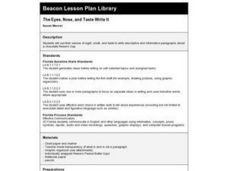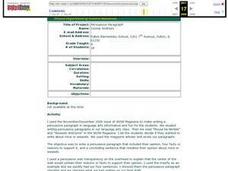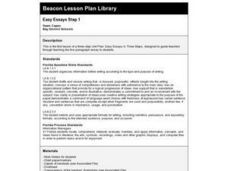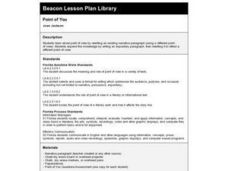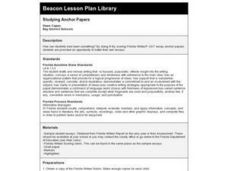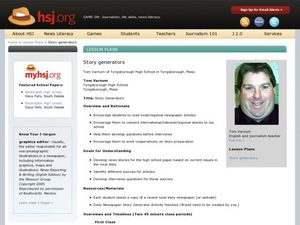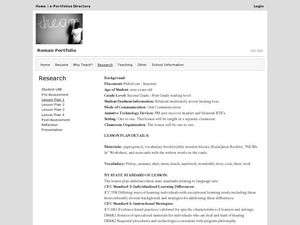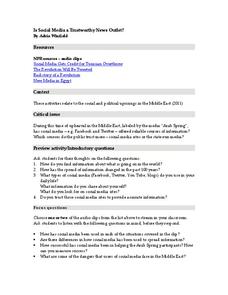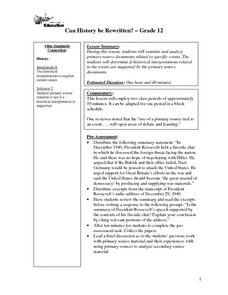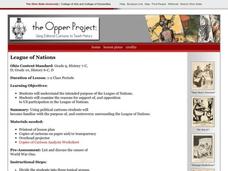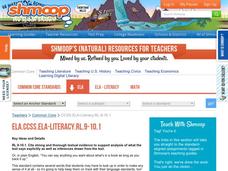Curated OER
The Eyes, Nose, and Taste Write It
Third graders generate a list of adjectives about a Reese's Cup using their sense of sight, touch, and taste. Then they write a descriptive paragraph about the Reese's Cup.
Curated OER
Writing About Holidays
Pupils research a holiday celebrated by their family and write a studenT story in which they explain the history of the holiday and describe ways in which it is celebrated.
Curated OER
Writing Persuasive Paragraphs
Fourth graders discover a fun-filled way to write persuasive paragraphs. After reading stories about mice and weasels, they choose which animal to be their topic. Students use a web outline to organize their opinion, four supporting...
Curated OER
Britain Information Blunder
Students read, analyze and critique a newspaper article about a benefit claimants, in Britain, that were warmed to check their bank accounts, after personal details of 25 million people were lost. They assess key vocabulary terms found...
Curated OER
Interpreting and Applying Information to Support Conclusions and Solve Problems
Sixth graders examine why cultures are sometimes misunderstood by other cultures. Using text, they develop supporting details to use in their own writing. They also participate in scenerios in which they test their decision making skills.
Curated OER
Cesar Chavez Biopoem
Students demonstrate their learning about Cesar Chavez and the United Farm Workers Union by writing a biopoem. They word process the poem.
Curated OER
Point of You
Sixth graders study point of view by rewriting an existing narrative paragraph (using a different point-of-view). They expand this knowledge by writing an expository paragraph, then rewriting it to reflect a different point-of-view.
Curated OER
Studying Anchor Papers
Students examine the Florida Writes! Rubric and discuss the basic elements of the scoring system. In small groups, they use the rubric to discuss and score several student essays.
Curated OER
Story Generators
Students develop news stories for the high school paper based on current issues in the local news. Students identify different sources for articles, and develop interviews questions. In this news ideas and sources lesson plan, students...
Curated OER
Fill Me In
Second graders work on expanding their vocabulary. In this personal writing lesson, 2nd graders practice word identification and complete a worksheet by filling in the blanks.
Curated OER
The Mayflower Story Up-Close and Personal
Learners gain a deeper understanding of what the early colonists experienced in search of a new life in America while giving them a taste of historical methodology. This is an engaging way to assess what your students know about the...
Curated OER
Essential Meaning in Text Using Non-fiction Information Source
Students practice the skill of summarizing in writing the content of a passage or text and point out the main points in the story. They revise their skills on note-taking that they took the semester before and fine tune them more...
Curated OER
Nine Planets
What are characteristics of a planet? With this plan, learners investigate the characteristics of the planets in our solar system. They gather research of the nine planets by using the Internet and other research tools. Then they create...
Curated OER
Is Social Media a Trustworthy News Outlet?
Examine the role of social media in social and political uprisings. Pupils listen to NPR audio clips about social media and the Arab Spring and read an article that proposes the idea that revolution will not happen through social media....
Curated OER
Can History Be Rewritten?
Can history be rewritten? Or, more precisely, is history documented accurately? High school juniors and seniors compare primary source material with secondary sources. For example, they compare President Roosevelt's December 29, 1940...
Florida Center for Reading Research
Multiple Meaning Words in Context
Multiple meaning words is the focus of a instructional activity designed to reinforce the use of context clues. Scholars listen carefully to a variety of sentences using the words pool and cast to decide which definition...
Curated OER
League of Nations
What is the League of Nations, when did it begin, and what is it's purpose? Young political minds can explore the answers to these questions through political cartoon analysis. Included are several political cartoons, an analysis...
Curated OER
Alexander Hamilton and the Roots of Federalism
Explore the origin of political parties in the United States. Learners work in groups to read and analyze copies of the "Report on Manufactures" written by Alexander Hamilton. Then, they complete a worksheet comparing the Federalists to...
Shmoop
ELA.CCSS.ELA-Literacy.RL.9-10.1
Does your ELA class need some practice with the specific skills outlined in the Common Core standards? Then this is the perfect resource for you! One in a series of connected lessons that cover the standards for reading literature,...
Curated OER
Marvelous World Of Magnets
Students research the concept of magnetism in order to increase understanding of the subject. By accessing information they could explain the concept with a written report used as an end product for assessment.
Curated OER
Important People from the 1930s to 1940s
Students study contributions of important people during the Great Depression. Using the internet, they research and collect information on an assigned individual. Students write an essay on the person researched.
Curated OER
Author's Influence Project
Eleventh graders use technology as a tool to research authors of literature being studied. Then students use a presentation program to make final presentations. This lesson allows them to create an understanding of the context related to...
Curated OER
Orienteering - Lesson 2 - Topographical Maps
One of the most important skills in orienteering is being able to read a topographical map. Understanding the contour lines and symbols and the scale of the map will make planning your route so much better. In this lesson, partners get...
